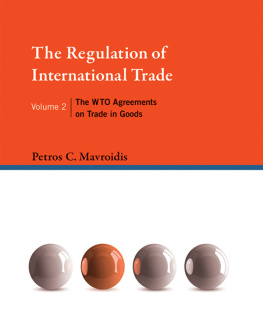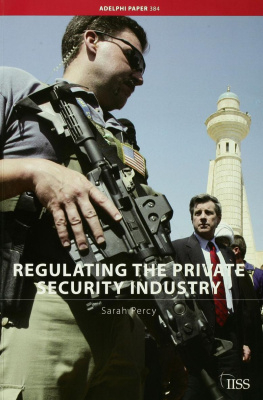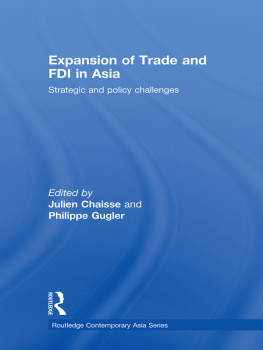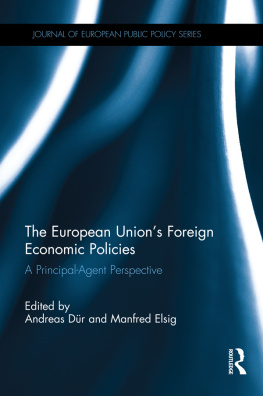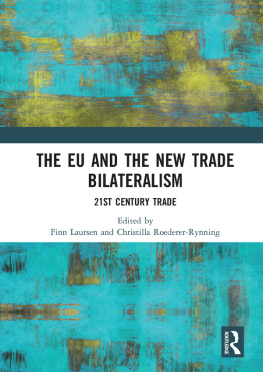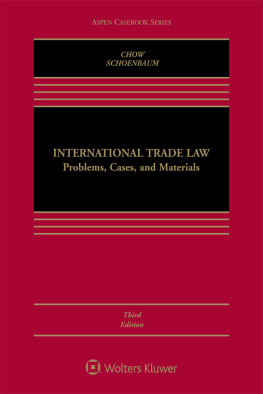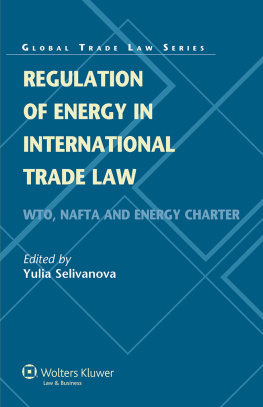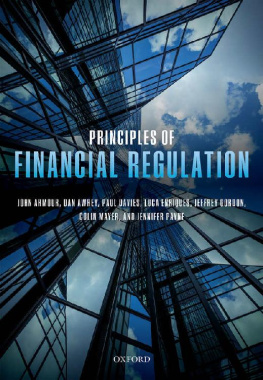Mavroidis - The Regulation of International Trade volume 2
Here you can read online Mavroidis - The Regulation of International Trade volume 2 full text of the book (entire story) in english for free. Download pdf and epub, get meaning, cover and reviews about this ebook. year: 2016, publisher: MIT Press, genre: Romance novel. Description of the work, (preface) as well as reviews are available. Best literature library LitArk.com created for fans of good reading and offers a wide selection of genres:
Romance novel
Science fiction
Adventure
Detective
Science
History
Home and family
Prose
Art
Politics
Computer
Non-fiction
Religion
Business
Children
Humor
Choose a favorite category and find really read worthwhile books. Enjoy immersion in the world of imagination, feel the emotions of the characters or learn something new for yourself, make an fascinating discovery.
- Book:The Regulation of International Trade volume 2
- Author:
- Publisher:MIT Press
- Genre:
- Year:2016
- Rating:4 / 5
- Favourites:Add to favourites
- Your mark:
- 80
- 1
- 2
- 3
- 4
- 5
The Regulation of International Trade volume 2: summary, description and annotation
We offer to read an annotation, description, summary or preface (depends on what the author of the book "The Regulation of International Trade volume 2" wrote himself). If you haven't found the necessary information about the book — write in the comments, we will try to find it.
Mavroidis: author's other books
Who wrote The Regulation of International Trade volume 2? Find out the surname, the name of the author of the book and a list of all author's works by series.
The Regulation of International Trade volume 2 — read online for free the complete book (whole text) full work
Below is the text of the book, divided by pages. System saving the place of the last page read, allows you to conveniently read the book "The Regulation of International Trade volume 2" online for free, without having to search again every time where you left off. Put a bookmark, and you can go to the page where you finished reading at any time.
Font size:
Interval:
Bookmark:
Petros C. Mavroidis
The MIT Press
Cambridge, Massachusetts
London, England
2016 Massachusetts Institute of Technology
All rights reserved. No part of this book may be reproduced in any form by any electronic or mechanical means (including photocopying, recording, or information storage and retrieval) without permission in writing from the publisher.
This book was set in Times New Roman by Toppan Best-set Premedia Limited. Printed and bound in the United States of America.
Library of Congress Cataloging-in-Publication Data is available.
ISBN: 978-0-262-02999-5
eISBN: 978-0-262-33370-2
10987654321
For Meritas always, as always
Commerce is a perpetual and peaceable war of wit and energy among all nations.
Jean-Baptiste Colbert, economic minister for Louis XVI
When goods do not cross borders, soldiers will.
Frdric Bastiat, 19th-century political economist and member of the French Assembly
I consider myself very fortunate to have learned my trade by giants in this field, in law, in economics, and in political science as well. I spent precious time next to John Jackson at the University of Michigan at Ann Arbor, whose 1969 book World Trade and the Law of GATT made a coherent whole out of GATT Secretariat papers, negotiating documents, and panel reports. It is there that I met Bob Hudec, who very generously spent a substantial amount of his time in the years since sharing his work and thoughts with me. Bobs and Johns works have been a major influence in the way I see the world trading system, and I think I will never thank them enough for all they have done for me and for the field where I (along with many others) now work.
My economist friends are many, and I will name my close collaborators/coauthors alphabetically: Kyle Bagwell, Chad P. Bown, Aaron Cosbey, Gene Grossman, Bernard M. Hoekman, Henrik Horn, Doug Irwin, Phil Levy, Patrick Messerlin, Damien Neven, Tom Prusa, Kamal Saggi, Andr Sapir, and Bob Staiger; thank you all very much. Jagdish Bhagwati has been my inspirational coteacher and mentor over many years at Columbia Law School.
My involvement in two research consortia has been a major catalyst in my understanding of the GATT/WTO regime. Lance Liebman included me in the American Law Institute (ALI) project on Principles of International trade: The WTO, where I served as chief reporter along with Henrik Horn. Mark Sanctuary led with skill and bonhomie the ENTWINED project on Trade and Environment, where I participated as an invited author, and contributed papers that I coauthored with Henrik Horn, but also with Aaron Cosbey and Bob Wolfe.
Working with specialists in various fields made me aware that it is not just the devil, but the entire citizenry of hell that lies in the details. This explains the amount of work presented here, and hopefully the decreasing number (when compared to previous work) of mistakes, for which I apologize a priori.
As always, I had to rely on many people who, instead of going about their lives, generously dedicated a disproportionate amount of their time reading my work. My collaborators, Neil Teller and Carlo-Maria Cantore, pretended that they found it interesting to read my work, and occasionally I believed them when they said as much. But even when I did not, I still passed on chapters for them to read and comment upon. Jonathan Chevry and Marianne Karttunen at EUI also generously shared with me their expertise, and their work.
Numerous academics and practitioners have shared their precious experience in their field of expertise with me: Alberto Alemanno, Steve Charnovitz, Antonio Corts, Bill Davey, Henrik Horn, Rob Howse, Cline Kauffmann, Patrick Low, David Palmeter, Ernst-Ulrich Petersmann, Frieder Roessler, Alan O. Sykes, Edwin Vermulst, Reinhard Weissinger, and Bob Wolfe. Terry Stewart shared with me various negotiating documents from his priceless archives, and responded to my incessant demands in no time.
At the WTO, current and former officials Inge Bauer, Jose Blanco, Tessa Bridgman, John Dickson, Richard Eglin, Marieme Fall de Perez Rubin, Alejandro Gamboa-Alder, Rodd Izadnia, Mark Koulen, Juan-Alberto Marchetti, Darlan Marti, Gabrielle Marceau, Andrea Mastromatteo, Julie Pain, Bruno Ventrone, Peter Williams, Donna Wood, Rhian-Mary Wood-Richards, and Mslm Yilmaz have helped me with dozens of queries that I have addressed to them, and always in the most satisfactory manner. At the WTO always, Diwakar Dixit, Taufiqur Rahman, Roy Santana, and Erik Wijkstrm read chapters of my book and provided me with precious comments. Any remaining errors are, of course, my own. Humberto Jimenez, delegate for Ecuador at the WTO, shared with me his experience from participating in various WTO fora.
My editor at MIT Press, Jane Macdonald, has been encouraging and absolutely wonderful from the first time we met and shared lunch at the Columbia Faculty House in New York City. It really mattered an awful lot to me to work with an editor who shared my enthusiasm for this work. Susan McClung, Marcy Ross, Emily Taber, and the staff and reviewers for MIT Press provided me with invaluable help and comments that vastly improved the quality of my original manuscript.
My debt to all the individuals mentioned above is huge, as is my debt to my family. My wife, Suja Rishikesh-Mavroidis, has yet again put her own career on the back burner in order to help me finish this book. It would have probably been a better allocation of our time if the opposite had happened. My only regret when writing this book is that I spent less time with her, and with our three daughters, Meera-Natalia, Riya-Valentina, and Tara-Elena. I started making up for all lost time at the precise moment that I had finished this preface.
Petros C. Mavroidis
Commugny, Switzerland
May 2015
I have changed my mind a dozen times (and probably will do so in the future) about the structure that a book aiming to explain the General Agreement on Tariffs and Trade/World Trade Organization (GATT/WTO) regime, like this one, should have. The objective I assigned to myself was to write a book that would be accessible to lawyers, political scientists, and economists. To do that, I wanted to ask first the question, What is the problem the GATT framers tried to solve? before explaining how they solved it. This is why, borrowing from previous work from economic historians and political scientists, I discuss at great length the negotiating history of each and every legal institution discussed in the two volumes, and have dedicated one full chapter (chapter 1 of volume 1) to the negotiating history of GATT, the cornerstone of the world trading system.
I have adopted a uniform structure for every chapter in an effort to facilitate the reader accessing the material. With the exception of chapter 1, I have included in every chapter first a discussion of the legal discipline discussed, in its context. It is followed by a discussion of the completion, so to speak, of the original contract through subsequent practice (that is, secondary law; e.g., law created by the various WTO bodies, as well as case law).
Now what do I mean by context? I do not use the term as lawyers typically use it. I intend to cover two different discussions under this umbrella. First is the rationale for the provision, as evidenced in the negotiating record and in case law (and point out discrepancies between the two, if any exist). Then, under what I categorize as Discussion in every chapter, I provide the basic economic rationale, as well as the policy background, for each provision discussed. I ask, in other words, what a particular provision is aimed to address, and show cases from the real world that illustrate each point. The reader can thus think about the legal institutions discussed in the two volumes in terms of two benchmarks: the negotiating record (that is, the problem that the authors of the legal institution aimed to solve), and the basic economic rationale explaining the necessity for the institution discussed. The theme negotiating record meets the economic rationale permeates the two volumes, and it is an issue that I try to address myself as well.
Font size:
Interval:
Bookmark:
Similar books «The Regulation of International Trade volume 2»
Look at similar books to The Regulation of International Trade volume 2. We have selected literature similar in name and meaning in the hope of providing readers with more options to find new, interesting, not yet read works.
Discussion, reviews of the book The Regulation of International Trade volume 2 and just readers' own opinions. Leave your comments, write what you think about the work, its meaning or the main characters. Specify what exactly you liked and what you didn't like, and why you think so.

